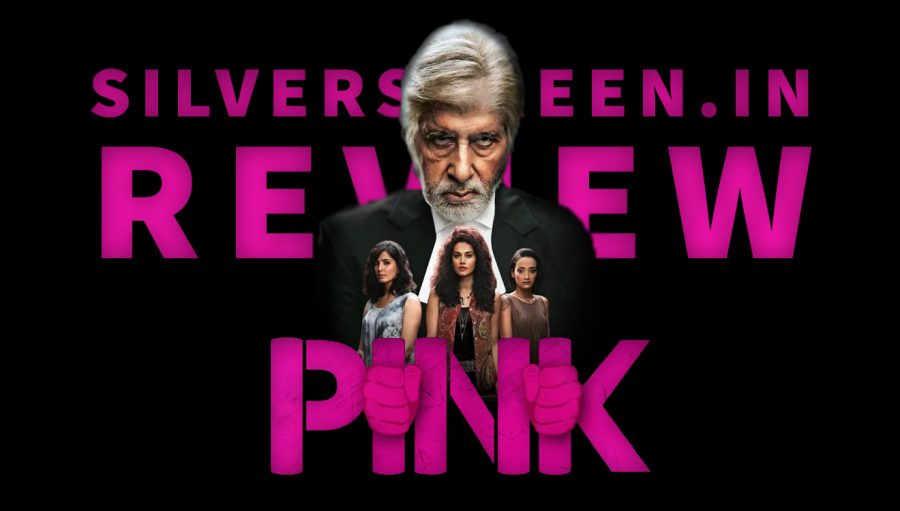Director Aniruddha Roy Choudhury’s Pink begins with a crime. The opening credits flash through the screen, and we hear snatches of conversation between a group of young men and women. Then suddenly, the screen becomes alive.
Meenal Arora (Taapsee Pannu), her hair in complete disarray, and her friends, Falak Ali (a brilliant Kirti Kulhari), and Andrea (Andrea Tariang) are huddled together in the backseat of a car. They appear to be in varying stages of shock.
Even after they’re inside the safe confines of their home, they seem rattled and on-edge. As if even the slightest provocation could kickstart a meltdown.
Soon enough, we see why.
*****
Rajvir Singh (Angad Bedi) is a privileged young man. Like a faux-model, he’s all gelled hair and suave suits. Hanging above his bed is a photograph of a gun. He sleeps surrounded by his own photos. In his universe, he reigns supreme.
As the nephew of a politician, he is used to things going his way. This sense of entitlement ultimately proves to be his own undoing.
Beaten and bleeding, this man-child is the sole cause of the women’s misery. He tries to force himself upon Meenal and is bludgeoned for his actions. He refuses to be chastened, though. Soon enough, the lackeys he calls friends begin to harass Meenal, Falak, and Andrea. The film enters dangerous territory here – Meenal is kidnapped and molested.
Dangerous, not because of the heinous crime that is committed. But because, there’s no sense of shock at what is shown onscreen.
Habituated as we are to these sordid tales of rape and abuse of women in India, we’ve become immune.
But this is precisely why Pink is such a timely film. Indian citizens are practically immune to stories like the one Pink works with, because it is far too prevalent. Sexual abuse, treating women like objects, and the consequences of living in a patriarchal society have become utterly normal.
How do we reconcile these incidents’ gruesomeness with their normality?
The underbelly of city life is full of young, entitled men like Rajvir, who possess the sheen of urban India. Underneath this façade, they’re like cave men who think ‘bad’ women are fair game. That good women do not drink, smoke, or wear short skirts.
Interestingly, it is the grand old men, Amitabh Bachchan and Dhrittiman Chatterjee (whose shaky voice does nothing to dim his star power), who come to the rescue of these women. Older generation they may be, and yet, it is they who prove to be more understanding of the choices the women make. Tellingly, the 20-something men, the so-called urban Indians, do not.
In fact, when Rajvir and his friends are accused of molesting Meenal, he doesn’t panic.
He accuses her of assault. And prostitution.
*****
Amitabh Bachchan is the silent spectre that looms over these women, just as he does in the film’s poster. Director Aniruddha Roy Choudhury does such a fine job of establishing the women’s independence early on, that it’s hard to watch the second half, when they’re effectively pushed to the sidelines. Or to believe them when they are suddenly rendered helpless.
Bacchan as Sehgal, the women’s lawyer, takes centrestage. With hollowed cheeks and a grim demeanour, he growls his way through the courtroom scenes. The film’s director hands him a halo, and a new duty as the kindly knight. And so this world-weary former lawyer ventures into his old stomping grounds, ready to join the crusade once again.
In perhaps its only glaring flaw, Pink continues with Indian cinema’s tradition of being clueless about depicting serious mental disorders onscreen. Sehgal is bipolar, and is shown to have a reaction time slower than that of the sloths in Zootopia. And this could very well be a side-effect of his advanced age, than his bipolar disorder.
Pink becomes a different kind of film when Bachchan appears. The actor is at his over-dramatic best here: a misfit in a largely subtle, sensitive movie. But with Sahgal’s appearance, the movie begins to sermonize. Aniruddha makes Bachchan the brand ambassador for his views on Indian men, rape, and gender relations. His intentions are honourable, yet the result is blatantly sermon-like scenes, with Bachhchan as the wild-eyed avenging angel, out to school Indian men on the many ways they mistreat women.
Nevertheless, it’s easy to overlook these flaws, given the strong performances from the female leads, and a beautiful background score. It’s also easier, because these scenes are tagged on towards the end of the film; and by then we’ve invested enough in the tale of these three young women. Women who have to explain every detail of their lifestyle, including their choice of clothing, all because they accused a powerful man of rape.
*****
Taapsee Pannu as Meenal Arora goes from being a spunky woman who dares these men to show her what they’re capable of, to a silent, withdrawn shell of a human being. Her hollow eyes say it all: she’s had more than her fair share of filth, and is ready to call it quits.
Only, something doesn’t quite let her.
Recommended
In court, these women, these mini-skirt wearing women who seem to prefer living on their own, are repeatedly accused of being prostitutes. Again and again and again, Piyush Mehra, as Prashanth, bombards them with accusations, watching like a hawk for signs of weakness. And pouncing, when he finds it.
Kirti Kulhari as Falak is made of sterner stuff. She refuses to break. She’s an iron woman who has survived trials before, and will continue to do so. When she does give way, it’s only to drive home a simple point: “Even if we did take money from the men, consent has to be given.”
It’s the anguish in that one line that decides the case.
Writer Ritesh Shah handles complex and important concepts like consent and mitigating circumstances wonderfully. They’re conveyed so sensibly, that even men like Rajvir, who are steeped in patriarchy, would get it.
At least, that is the hope.
*****
The Pink review is a Silverscreen original article. It was not paid for or commissioned by anyone associated with the movie. Silverscreen.in and its writers do not have any commercial relationship with movies that are reviewed on the site.



